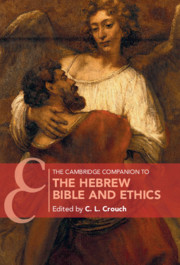Book contents
- The Cambridge Companion to the Hebrew Bible and Ethics
- Cambridge Companions to Religion
- The Cambridge Companion to the Hebrew Bible and Ethics
- Copyright page
- Dedication
- Contents
- Notes on Contributors
- Introduction
- Part I Legal Ethics
- Part II Narrative Ethics
- 6 Creation Ethics in Genesis
- 7 Migrant Ethics in the Jacob Narratives
- 8 Settler Mandates and the Book of Joshua
- 9 David’s Ethic of Togetherness and Its Victims
- 10 Ethics and Ethnicity in the Deuteronomistic History
- Part III Prophetic Ethics
- Part IV Wisdom/Poetic Ethics
- Part V Faithful Ethics
- Index
- Cambridge Companions to Religion (continued from page iii)
- References
8 - Settler Mandates and the Book of Joshua
from Part II - Narrative Ethics
Published online by Cambridge University Press: 05 February 2021
- The Cambridge Companion to the Hebrew Bible and Ethics
- Cambridge Companions to Religion
- The Cambridge Companion to the Hebrew Bible and Ethics
- Copyright page
- Dedication
- Contents
- Notes on Contributors
- Introduction
- Part I Legal Ethics
- Part II Narrative Ethics
- 6 Creation Ethics in Genesis
- 7 Migrant Ethics in the Jacob Narratives
- 8 Settler Mandates and the Book of Joshua
- 9 David’s Ethic of Togetherness and Its Victims
- 10 Ethics and Ethnicity in the Deuteronomistic History
- Part III Prophetic Ethics
- Part IV Wisdom/Poetic Ethics
- Part V Faithful Ethics
- Index
- Cambridge Companions to Religion (continued from page iii)
- References
Summary
The book of Joshua presents a multitude of ethical quandaries, both ancient and modern. After identifying some of the key questions about the text and its composition, our discussion will trace the distinctive kinds of influence that this book has exercised in a number of Jewish and Christian traditions. All of these elements will then figure in concluding reflections on how the book of Joshua may, and may not, help us to reflect on the legacies of imperialism and colonialism.
- Type
- Chapter
- Information
- The Cambridge Companion to the Hebrew Bible and Ethics , pp. 117 - 130Publisher: Cambridge University PressPrint publication year: 2021



